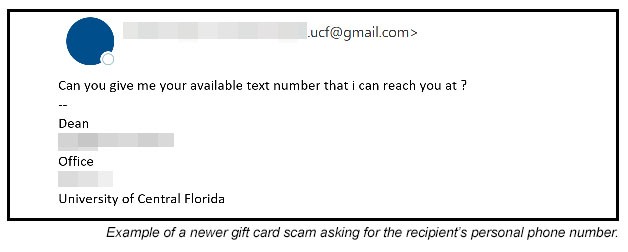What are gift card scams?
Gift cards have become a popular way for scammers to steal your money. Scammers will send you an email, often impersonating your coworkers or supervisor, asking you to purchase gift cards for a special event. They may even say it’s a surprise for the office, asking you to be discreet. Often the sender will claim to be in a meeting and unable to take calls, preventing you from calling to confirm the request.
The initial email may start out innocuously, asking if you are available, stating that they need a favor, or asking for your phone number so you can receive text messages. Once you respond, the scammer will ask you to purchase gift cards, specifying the quantity and denomination. The message will ask you to scratch off the cards to reveal the codes, take pictures of those codes, and then reply back with those pictures.
If you reply with the cards’ codes, your money is now in the hands of the scammer. Gift cards are treated as cash, and in many cases, cannot be refunded.
How can I spot these scams?
In most cases, the sender information is falsified to make it appear to be coming from a UCF email address. Remember:
Pay close attention to the sender’s address. If on a mobile device, tap the sender’s name to reveal the actual email address. If the sender’s address ends in @gmail.com, @outlook.com, or anything other than @ucf.edu, the request is most likely a scam.
Contact the person who is requesting these gift cards in person or through a known trusted phone number.
Never send gift card codes via email without confirming the request in person.


what if i provided my personal phone number?
If you responded to a phishing email and provided your cell phone number, you’ll need to be aware of the increased potential for future phishing messages. Known as smishing (or SMS phishing), the messages can impersonate coworkers, supervisors, financial institutions or other companies.
It can be difficult to spot malicious links in text messages, which is why we recommend not clicking on links or calling numbers provided by text messages. If you receive an unexpected text message claiming to be from your bank or other organization, contact the company via a known good number, such as the phone number printed on the back of your bank card.
By remembering that sender information can be falsified, you can remain vigilant and spot these fake messages. In these situations, InfoSec recommends that you block the phone number that sent you the text message.
Contact Information to Report Scams
Call 1-888-280-4331
More information about Amazon gift card scams: https://www.amazon.com/giftcardscams/b?ie=UTF8&node=15435487011
Call 1-855-466-4438
Report gift card scams online: https://support.google.com/faqs/answer/2952493
More information about Google Play gift card scams: https://support.google.com/googleplay/answer/9057338?hl=en&ref_topic=9057343
Call 1-800-275-2273, press 6 for “other,” then say “operator” to be connected to a live representative.
More information about iTunes gift card scams: https://support.apple.com/itunes-gift-card-scams
If you have a Steam account, you can report gift card scams online: https://help.steampowered.com/en
More information about Steam gift card scams: https://support.steampowered.com/kb_article.php?ref=7797-AKLC-2742&l=
Call 1-866-795-7969
Report a MoneyPak gift card scam online: https://www.moneypak.com/security
